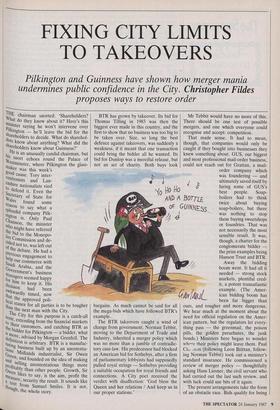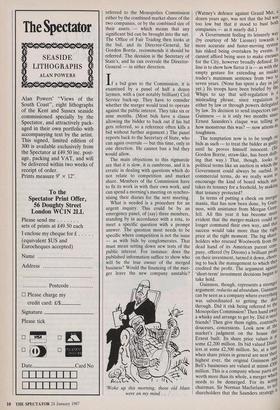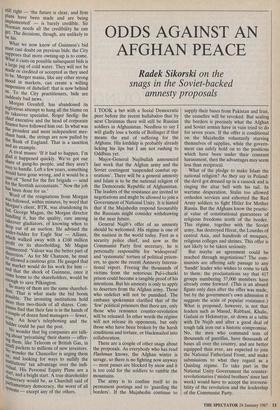FIXING CITY LIMITS TO TAKEOVERS
Pilkington and Guinness have shown how merger mania
undermines public confidence in the City. Christopher Fildes
proposes ways to restore order
THE__ chairman snorted: 'Shareholders? What do they know about it? Here's this Minister saying he won't intervene over Ildkington — he'll leave the bid for the shareholders to decide. What do sharehol- ders know about anything? What did the shareholders know about Guinness?' He is an unusually candid chairman, but his snort echoes round the Palace of Westminster where Pilkington the glass- maker was this week's Pod cause. Tory inter- ventionists and Lan- cashire nationalists vied to defend it. Even the Secretary of State for Wales found some reason to say what a sPlendid company Pilk- 111,Aton is. Only Paul k-hannon, the minister who might have referred he bid to the Monopo- les Commission and de- cided not to, was left out of the debate. He had a Previous engagement to help our commerce with Saudi Arabia, and the wivernment's business Managers seemed happy Tirhim to keep it. His decision had been awkwardly timed, now _Mat the approved poli- tical stance for all parties is to be than the next man with the City. The City for this purpose is a catch-all lttn, extending from the financial markets the their customers, and catching BTR as iihe bidder for Pilkington — a bidder, what ds more, advised by Morgan Grenfell. The ..enition is arbitrary. BTR is a manufac- t'u. ring business built up by an unostenta- Gi°us Midlands industrialist, Sir Owen Green and founded on the idea of making and selling unostentatious things more 1,3ofitably than other people. Growth, Sir uwen likes to say, is the aim, profit the aeasure, security the result. It sounds like text from Samuel Smiles. It is not, though, the whole story. tougher BTR has grown by takeover. Its bid for Thomas Tilling in 1983 was then the biggest ever made in this country, and the first to show that no business was too big to be taken over. Size, so long the best defence against takeovers, was suddenly a weakness, if it meant that one transaction could bring the bidder all he wanted. Its bid for Dunlop was a merciful release, but not an act of charity. Both buys look bargains. As much cannot be said for all the mega-bids which have followed BTR's example. The BTR takeovers caught a wind of change from government. Norman Tebbit, moving to the Department of Trade and Industry, inherited a merger policy which was no more than a jumble of contradic- tory case-law. His predecessor had blocked an American bid for Sothebys, after a firm of parliamentary lobbyists had supposedly pulled royal strings — Sothebys providing a suitable occupation for royal friends and connections. A City poet received the verdict with disaffection: 'God bless the Queen and her relations / And keep us in our proper stations.' Mr Tebbit would haye no more of this. There should be one test of possible mergers, and one which everyone could recognise and accept: competition. That made sense. It had to mean, though, that companies would only be caught if they bought into businesses they knew something about. GUS, our biggest and most professional mail-order business, could not reach out for Grattan, a mail- order company which was foundering — and ultimately saved itself by hiring some of GUS's best people. Soap- boilers had to think twice about buying soap-boilers, but there was nothing to stop them buying sweetshops or foundries. That was not necessarily the most sensible result. It was, though, a charter for the conglomerate bidder - the prize examples being Hanson Trust and BTR. Away the bidding boom went. It had all it needed — strong stock markets, plentiful cred- it, a potent transatlantic example. (The Amer- ican bidding boom has been far bigger than ours, and rougher and more dangerous. We hear much at the moment about the need for official regulation on the Amer- ican pattern, but the regulators let every- thing pass — the greenmail, the poison pills, the golden parachutes, the junk bonds.) Ministers here began to wonder where their policy might leave them. Paul Ch.. .thin (following Leon Brittan, follow- ing Norman Tebbit) took out a minister's standard insurance. He commissioned a review of merger policy — thoughtfully asking Hans Liesner, the civil servant who had carried out the last such review, and with luck could use bits of it again. The present arrangements take the form of an obstacle race. Bids qualify for being referred to the Monopolies Commission either by the combined market share of the two companies, or by the combined size of their assets — which means that any significant bid can be brought into the net. The Office of Fair Trading then looks at the bid, and its Director-General, Sir Gordon Borrie, recommends it should be referred. The decision is the Secretary of State's, and he can overrule the Director- General — in either direction.
If a bid goes to the Commission, it is examined by a panel of half a dozen laymen, with a (not notably brilliant) Civil Service back-up. They have to consider whether the merger would tend to operate against the public interest. They take six or nine months. (Most bids have a clause allowing the bidder to back out if his bid gets referred, so a reference often kills a bid without further argument.) The panel reports back to the Secretary of State, who can again overrule — but this time, only in one direction. He cannot ban a bid they would allow.
The main objections to this rigmarole are that it is slow, it is cumbrous, and it is erratic in dealing with questions which do not relate to competition and market share. Members of the Commission have to fit its work in with their own work, and can spend a morning's meeting on synchro- nising their diaries for the next meeting.
What is needed is a procedure for an urgent inquiry. This could be by an emergency panel, of (say) three members, standing by in accordance with a rota, to meet a specific question with a prompt answer. The question most needs to be specific where competition is not the issue — as with bids by conglomerates. That must mean setting down new tests of the public interest. For instance: does the published information suffice to show who will be the true owner of the merged business? Would the financing of the mer- ger leave the new company unstable?
`Woke up this morning, those old blues were on my mind . . (Watney's defence against Grand Met, a dozen years ago, was not that the bid was too low but that it stood to bust both companies — as it nearly did.) A Government feeling its leisurely waY (by courtesy of Mr Liesner) towards a more accurate and faster-moving system has risked being overtaken by events. It cannot afford being seen to make excuses for the City, however broadly defined. Its line is to show how fierce it is — as with the empty gesture for extending an insider trader's maximum sentence from two. to . seven years. (None has spent a day in jail yet.) Its troops have been briefed by the Whips to say that self-regulation is a misleading phrase, since regulation 1.s, either by law or through powers delegate' by law. Its decision to send inspectors MW Guinness — is it only two months sinee Ernest Saunders's claque was telling us how monstrous this was? — now attests its toughness.
The temptation now is to be tough .011 bids as such — to treat the bidder as gat,' until he proves himself innocent. Pr Gordon Borrie, straw-like, has been dui!' Mg that way.) That, though, looks in political terms like an auction in which the Government could always be outbid. In commercial terms, do we really want CO encourage the kind of board which Os' takes its tenancy for a freehold, by making that tenancy protected? In terms of putting a check on merger mania, that has now been done, by Ginn' ness, with assistance from Morgan Gra' fell. All this year it has become more evident that the merger-makers could no longer command their own way, and that success would take more than the right price at the right moment. The big share- holders who rescued Woolworth from the dead hand of its American parent VI:• pany, offered (by Dixons) a brilliant profit on their investment, turned it down, choos• ing to back the management to which theY credited the profit. The argument against `short-term' investment decisions began t° take hold. Guinness, though, represents a stronger argument: reductio ad absurdum. Guinness can be seen as a company where everythil was subordinated to getting the de through. Did it risk being referred to the Monopolies Commission? Then hand al a whisky and arrange to get by. Did it need friends? Then give them rights, contracts, douceurs, concessions. Look now at the market's judgment on the house that Ernest built. Its share price values it .at , some £2,200 million. Its bid valued Distil' lers at some £2,500 million. So, at a tiro! when share prices in general are near theird highest ever, the original Guinness an Bell's businesses are valued at minus 0',no million. This is a company whose parts ar worth more than its whole, a merger which needs to be demerged. For its actil chairman, Sir Norman Macfarlane, to tel shareholders that the Saunders strategy is still right — 'the future is clear, and firm plans have been made and are being implemented' — is barely credible. Sir Norman needs all the credibility he can get. The decisions, though, are unlikely to be his What we now know of Guinness's bid must cast doubt on previous bids: the City supposes that more owning-up is to come. What it casts on possible subsequent bids is a large jug of cold water. They will not be made or credited or accepted as they used to be. Merger mania, like any other strong mood in markets, can create a willing suspension of disbelief: that is now behind us. To the City practitioners, bids are suddenly bad news. Morgan Grenfell, has abandoned its inglorious attempt to hang all the blame on its takeover specialist, Roger Seelig: the chief executive and the head of corporate finance have followed him out. In what was the proudest and most independent mer- chant bank, the strings are now pulled by the Bank of England. That is a sanction and an example. A rival muses: 'If it had to happen, I'm glad it happened quickly. We've got our Share of gung-ho people, and they aren't easy to handle. Left a few years, something would have gone wrong, and it would be a case of "Send for the fire brigade — send for the Scottish accountants." Now the job has been done for us.' Word of the resignations from Morgan Was followed, within minutes, by word that t an organ's client, BTR, was abandoning its bid, George Magan, the Morgan director handling it, has the quality, rare among takeover gladiators, of knowing when to drop out of an auction. He advised the udder-bidder for Eagle Star — Allianz, which walked away with a £160 million Profit on its shareholding. Mr Magan commented: 'Valour was the better part of tscretion.' As for Mr Channon, he must allowed a cautious grin. He gauged that the market would do his work for him - and that the shock of Guinness, once it cattle home to the shareholders, would be enough to save Pilkington. S° many of them are the same sharehol- ders. That is what made the bid boom Possible. The investing institutions hold more than two-thirds of all shares. Corn- :allies find that their fate is in the hands of e couple of dozen fund managers — fewer, Yen. An hour's telephoning and the bidder could be past the post. No Wonder that big companies are talk- ing 'privatising' their shares — offer- s-8 them, like Telecom or British Gas, in small packets to millions of new investors. ° wonder the Chancellor is urging them 0 and looking for ways to nullify the institutions' ci tax advantage over the indi- sual. His Personal Equity Plans are a d'u, and a bright start. A true shareholder ,s'etnocracy would be, as Churchill said of ,,vadiamentary democracy, the worst of all Isteins except any of the others.




















































 Previous page
Previous page